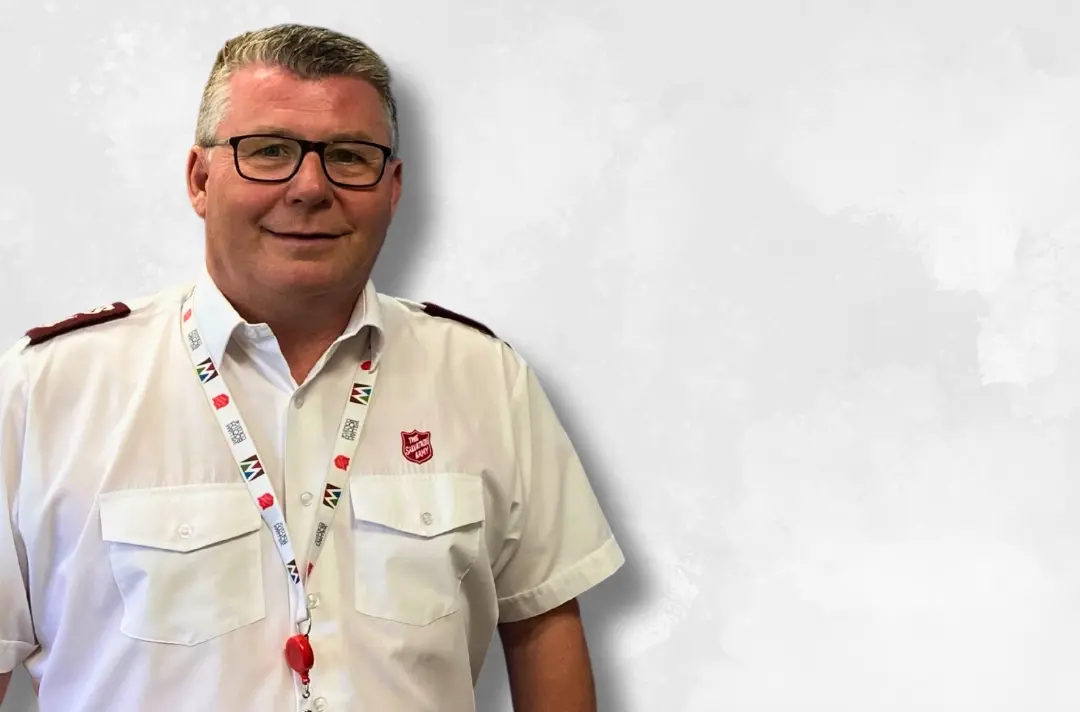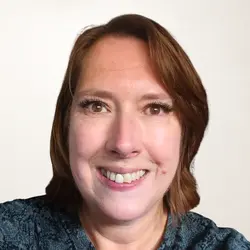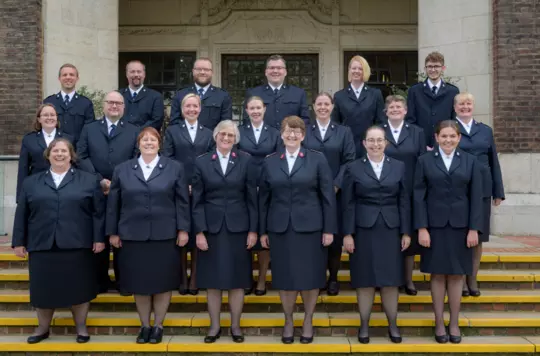4 May 2023
‘God is definitely still calling people’
Lyn Woods

Lyn Woods talks with Territorial Candidates Director Major Mark Sawyer about spiritual leadership in the UKI Territory today.
What methods are most effective in enabling people to respond to a call to spiritual leadership?
I think the most effective way is for people who are in spiritual leadership to role model the joy of ministry and be intentional about investing in others. As an officer, I want to be mentoring, encouraging, discipling and supporting people on their faith journeys. Sometimes gently encouraging them to think about leadership or challenging them strongly about a calling. The one-to-one conversations are so important. Probably more so than events or specific programmes!
Exploring Leadership Day is very popular. We held one recently at the William Booth College and we had a ‘calling conversation café’, where people could talk about vocation and what God is calling them to do and to be. We had a prayer room for people to explore different ways of praying, coming before the Lord and seeking his will. We shared in all-age worship, which was a new experience at this event. I believe passionately that children are called, and we wanted to let the children know how loved, valued and cherished they are by the God who put the stars in space and to remember always that he has a plan for their lives.
Some divisions are running the Growing Leaders course, which has proved very helpful. This involves teaching, Bible study and hands-on experience of leadership, with great fellowship giving opportunities to share stories and ideas.
The Terrain Youth programme, run by the Children and Youth Department, is a really good tool for young people to experience all kinds of teaching and learning from the Bible, bringing out faith and life lessons for today. These opportunities help ground our young people in a journey of faith that naturally causes them to think about leadership and life choices.
Addlestone Corps offers gap year opportunities and St Ives Corps is now rolling that out too. You can access more information from their corps websites.
Some of these initiatives take a lot of planning, but I know of some divisions who have simply held evenings at their DHQ called ‘the calling conversation’. They have gathered people who are interested in talking about calling, vocation, ministry, officership, territorial envoyship and pioneering, simply to talk and see where it leads. These events look like the early Church, when the first believers met together, sharing food and conversation about life, faith and Jesus.
If you’re thinking about ministry and vocation, then talk to someone and start the conversation. If it’s right, then doors will open. But if you never test it, you’ll never know.
Could Design for Life be more effective if it was held divisionally?
The Design for Life course (DFL) is a great experience for anyone over 18. Many people say they love coming to William Booth College, maybe having a tour, going up the tower or seeing the museum. DFL has taken place in Ireland and Scotland, and we’re looking at different ways of putting it out there. There’s even a children’s DFL now – which is exciting!
Is there a shift in the way leadership is perceived and practised now?
These are challenging – yet potentially exciting – days in the Church and in The Salvation Army. There are lots more opportunities for lay ministry and vocation than there were in previous years. The whole concept of leadership for a season is an interesting one, which we introduced years ago through territorial envoyship. You can make a commitment to serve for three years as a territorial envoy and that is often based within the division that you applied from. The interesting thing is that, when people have tested leadership for a season, they often go on to commit to more time in spiritual ministry. Some become officers, while others continue as territorial envoys.
God is definitely still calling people in the Army to that lifetime commitment as officers. We are exploring the possibility of other routes and ways, building on all that’s happened in the past, but adjusting for this day and generation.
We must also remember that we believe in the priesthood of all believers. People of all ages, who are not officers but are ministering on their front line, are leaders too, they’re part of this priesthood.
During and coming out of the Covid-19 pandemic, people have asked themselves questions like: Where am I going? What am I doing with my life? What’s really important for me in the days ahead? I think those two years helped us all to adjust and align priorities, gaining more of a sense about what’s important. Deeper faith choices have been made, including the desire to explore officership. I’m excited about the future and what I’m sensing and seeing in our territory.
When people ask me how many cadets I’m getting into the college, I have to smile and tell them that it’s not up to me or the Candidates Unit, it’s up to the Lord! But it’s also about what we are doing. It’s for each one of us to invest in others and speak into their lives, helping them discern and discover God’s will for themselves. Having a small number of cadets in the training college is not just a UKI Territory challenge, it’s a western world challenge. Some developing countries are seeing a big response to leadership, which is beautiful, but God is wanting his will and purpose to be lived out in all parts of the globe. So, we continue to listen to what he is specifically saying to us for this season.
I want to challenge everyone to be sensitively and sensibly asking people: ‘Are you encouraging, inspiring and challenging others to think about leadership?’ We shouldn’t just leave it to Candidates Sunday or to someone else!
How do the ideals of spiritual leadership compare to the realities?
The WBC programme seeks to equip cadets with all kinds of ministry tools, skills and gifts to help them in various aspects of ministry. It’s very innovative and creative. There are opportunities to go into placements and learn from corps, and they gain experience through learning and doing. They also adopt a project, based on something that the Lord is stirring in their hearts. They may work in a residential centre or Lifehouse, or in a different cultural experience. Every corps and centre expression is different, and this is good.
The reality is that, when you leave the college, you’ll have to adapt some of your learning and teaching. Into Officership training continues for another five years and, just like in every area of life, there is always more to learn. The reality is that nothing can prepare you totally for when you leave the college.
This year’s Candidates Sunday video shows different people of different ages painting a word picture that spells the phrase ‘be the light’, taken from Matthew 5:14-16 (The Message).
I simply and sincerely pray that in these days God will show us all how we can be the best God colours in the world today so that we can make a difference in this world and be the change!
Written by

Lyn Woods
Editorial Assistant
Discover more

Here to serve and support all those in the territory who are exploring God's calling.

DFL is a weekend retreat at William Booth College to help you discern God's calling.
